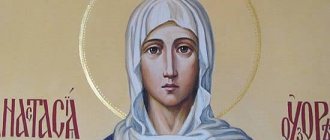Patron saints of Valery and Valeria in Orthodoxy
In the Orthodox Saints, the bearer of the male name Valery has several patron saints:
- Valery Melitinsky, who accepted martyrdom for Christ through torture and beheading;
- Valery of Sebastia, who suffered martyrdom through torture on Lake Sebastia, in severe frost, and died on its shore.
Holy Martyr Valery of Sebaste
Women in Orthodoxy bearing the name Valeria also have two patron saints:
- Valeria of Caesarea, who suffered martyrdom for her religion;
- Valeria, a queen who was forcibly married to the pagan Emperor Maximilian, was executed for her faith in Christ.
We also advise you to familiarize yourself with when Marina’s name day is.
Martyr Valery of Sebaste, icon in frame 12.5*14.5 cm
Martyr Valery of Sebastia - one of the forty Martyrs of Sebastia
Lives of the Forty Martyrs of Sebaste
In 313, Saint Constantine the Great issued a decree according to which Christians were allowed freedom of religion and were given equal rights with pagans.
But his co-ruler Licinius was a convinced pagan and in his part of the empire he decided to eradicate Christianity, which had spread significantly there. Licinius was preparing for war against Constantine and, fearing treason, decided to clear his army of Christians. At that time, in the Armenian city of Sebastia, one of the military leaders was Agricolaus, a zealous supporter of paganism. Under his command was a squad of forty Cappadocians, brave warriors who emerged victorious from many battles. They were all Christians. When the warriors refused to sacrifice to the pagan gods, Agricolaus imprisoned them. The soldiers indulged in fervent prayer and one night they heard a voice: “He who endures to the end will be saved.”
The next morning the soldiers were again brought to Agricolaus. This time the pagan used flattery. He began to praise their courage, youth and strength and again invited them to renounce Christ and thereby gain the honor and favor of the emperor himself. Hearing a refusal again, Agricolaus ordered the soldiers to be chained. However, the eldest of them, Kirion , said: "The Emperor did not give you the right to place fetters on us." Agricolaus was embarrassed and ordered the soldiers to be taken to prison without shackles.
Seven days later, the noble dignitary Lysias arrived in Sebastia and held a trial of the soldiers. The saints firmly answered: “Take not only our military rank, but also our lives, for us there is nothing dearer than Christ God.” Then Lysias ordered the holy martyrs to be stoned. But the stones flew past their target; a stone thrown by Lysias hit Agricolaus in the face. The torturers realized that the saints were protected by some invisible force. In prison, the soldiers spent the night in prayer and again heard the voice of the Lord comforting them: “He who believes in Me, even if he dies, will live. Be bold and do not be afraid, for you will receive imperishable crowns.”
The next day, the trial before the torturer and the interrogation were repeated, but the soldiers remained adamant.
It was winter, there was severe frost. They stripped the holy warriors, led them to a lake located not far from the city, and placed them under guard on ice for the whole night. To break the will of the martyrs, a bathhouse was lit nearby on the shore. In the first hour of the night, when the cold became unbearable, one of the warriors could not stand it and ran towards the bathhouse, but as soon as he crossed the threshold, he fell dead. At three o'clock in the morning, the Lord sent consolation to the martyrs: suddenly it became light, the ice melted, and the water in the lake became warm. All the guards were asleep, only one named Aglaius . Looking at the lake, he saw that a bright crown had appeared over the head of each martyr. Aglaius counted thirty-nine crowns and realized that the fleeing warrior had lost his crown. Then Aglaius woke up the rest of the guards, took off his clothes and told them: “And I am a Christian!” - and joined the martyrs. Standing in the water, he prayed: “Lord God, I believe in You, in whom these soldiers believe. Join me to them, so that I may be worthy to suffer with Your servants.”
The next morning the torturers were surprised to see that the martyrs were alive, and their guard Aglaius was glorifying Christ with them. Then the soldiers were taken out of the water and their legs were broken. During this painful execution, the mother of the youngest of the warriors, Meliton , urged her son not to be afraid and to endure everything to the end. The bodies of the martyrs were placed on chariots and taken to be burned. Young Meliton was still breathing, and he was left lying on the ground. Then the mother picked up her son and carried him on her shoulders after the chariot. When Meliton breathed his last, his mother laid him on a chariot next to the bodies of his holy companions. The bodies of the saints were burned at the stake, and the charred bones were thrown into the water so that Christians would not collect them.
Three days later, the martyrs appeared in a dream to Blessed Peter, Bishop of Sebaste, and ordered him to bury their remains. The bishop and several clergy collected the remains of the glorious martyrs at night and buried them with honor.
Troparion to the 40 Martyrs of Sebastia, tone 1
Through the illnesses of the saints, who suffered for You,/ I pray, O Lord,/ and heal all our illnesses,// O loving people, we pray.
Kontakion 40 Martyrs of Sebaste, tone 6
All the hosts of the world have left,/ cling to the Lord in Heaven,/ the fourty passion-bearers of the Lord,/ having passed through fire and water, blessed ones,/ deservedly received glory from Heaven// and in There are a lot of ents.
Prayer to the 40 Martyrs of Sebaste
Oh, holy, glorious passion-bearers of Christ, four ten, in the city of Sebastia Christ for the sake of those who courageously suffered, through fire and water they passed through, and as friends of Christ to the rest of the Heavenly King Having arrived, you have great boldness to intercede with the Most Holy Trinity for the Christian race: especially for those who worship to your holy memory, and to those who call upon you with faith and love. Ask the all-merciful God for forgiveness of our sins and correction of our lives, and in repentance and unfeigned love for each other, having lived with each other, we will boldly present ourselves to the Last Judgment of Christ, and with your representation on the Odessa Let us present ourselves to the Righteous Judge. To her, pleasers of God, be our protector from all enemies, visible and invisible, so that under the roof of your holy prayers we will get rid of all troubles, evils and misfortunes until the last day of our lives, and thus glorify the great some venerable name of the All-Effective Trinity, the Father and the Son and the Holy Spirit, now and ever and unto ages of ages. Amen.
Life of Saint Valery Melitinsky
The life of Saint Valery of Melitino occurs during the bloody early Christian persecutions, during the reign of the pagan emperors of Rome Maximilian and Diocletian. The saint lived in the territory of Cappadocia, and was one of the soldiers of Diocletian's squad, led by Hieron.
When the mass destruction of believers by pagans began, Diocletian ordered the cruel and crafty Lysias to go to Cappadocia, so that he would resolve the issue with the Christian attitude of the inhabitants of this city. And he zealously set to work, gathering around himself pagan squads who zealously dealt with the children of Christ.
Having learned that Hieron and his squad were very strong, Lysias wanted to gain his favor, but the news awaited him that the entire squad was of the Christian faith. This led to the fierce pursuit of all 33 warriors, among whom was Valery Melitinsky.
Valery, together with his brothers in Christ, fleeing from arrest, hid in a cave, where they had to fight with pagan warriors, who could not take them by force. Then the pagans came up with an idea to lure out his military leader, Hieron, by allowing his friend and mother to influence his mind. But Hieron only said goodbye to them, saying that he would never change his faith, just like his soldiers. He returned to his squad, who agreed to surrender to their enemy and accept martyrdom for Christ.
Saint Valery, like his brothers, was taken into custody, and was taken out only for fierce torture, so that he would renounce the Christian faith and perform pagan sacrifices. The saint's demonstrated steadfastness only irritated and embittered the tortures being committed. Neither flattery nor terrible torment could break the will of the saint. Lysias sentenced them to death by beheading.
Walking to the place of his death, Valery, together with his brothers, joyfully sang words from the psalms, and then, kneeling, prayed to God to accept his soul. With these words, the head of Saint Valery was cut off.
Life of Saint Valeria of Caesarea
Very little is known about the life path of the early Christian saint Valeria of Caesarea, and the data that is present in the Lives of the Saints is very scarce.
One thing is known for certain, that Valeria lived in the Palestinian city of Caesarea, at the turn of the 2nd and early 3rd centuries, during a time of particularly fierce persecution of Christians, during the reign of Emperor Diocletian. He strengthened the borders of his country and restored peace in the Roman Empire, but could not cope with the influence of spreading Christianity.
Together with Galerius, his co-ruler, Diocletian issues decrees prohibiting the Christian religion, and fierce persecution of the children of Christ occurs everywhere, Christian books were destroyed and churches were closed, under the guise of various threats, renunciation of faith in Christ was required, and those who did not agree were executed.
Valeria, together with her sisters in Christ, at this time lived away from the bustle of the world, leading a righteous life, praying for the people, for the forgiveness of sins and an end to persecution. They also helped all those suffering and enlightened people about the advantages of the new faith over faith in paganism. Fierce zealots of the pagan faith found out about their activities and reported to their ruler.
The captured Valeria and her sisters were arrested, and they tried to force them to make sacrifices to the pagan deity using all kinds of methods, from exhortations and terrible torture. Valeria was the first to refuse to perform the required actions, followed by her friends, which resulted in an immediate death penalty.
The name Valeria in the Saints
This name appears twice in the church name book: on May 6 and June 20.
Meaning of the name
This anthroponym came from Byzantium and in Latin means “strong”, “beautiful”.
From him 2 name forms are formed - male (Valery) and female. Russian linguist A. Superanskaya believed that Valeria could come from the ancient Greek name Kaleria, in which the stem “kale” also means “beautiful”, “beautiful”.
Other name options: Valera, Lera, Valya, Leka, Vaka. Foreign pronunciation: Valeria, Valeri, Valeliya, Valeria.
Main features
The energy of the name is quite mobile, with a degree of uncertainty, which makes Valeria’s character unbalanced and her actions unpredictable. Thanks to the existence of a male analogue of the name, a woman combines masculinity and femininity. The latter quality is the cause of lack of stamina.
Character
Valeria is cheerful, cheerful, purposeful, but at the same time easily excitable, with a restive and hot-tempered character. Dissatisfaction with the behavior of the subject of communication can result in an outburst of anger. The unpredictability of feelings is manifested in the fact that in similar situations her actions can be diametrically opposed, and her temper and harshness are surprisingly combined with sentimentality. This hides the mystery of nature. Lera herself gets tired of such imbalance, so she intuitively reaches out to calm, sober-minded people. It is precisely from these men, who are also wealthy and accomplished, that he chooses a life partner.
Character flaws: rigidity, jealousy and excessive demands. For this reason, Valeria raises her own children in strictness, and in marital relationships she often goes into conflict, which does not help strengthen the marriage bond. But at the same time, she is a faithful wife, an excellent housewife, although she doesn’t really favor guests, and she herself tries to avoid parties.
Valera loves to study, constantly improves herself, but lacks perseverance. To achieve success in her career and personal life, she needs to curb impulsiveness and create an “emotional window” in the form of creativity, sports or a hobby.
Important: despite the strength and firmness of character, Lera is a vulnerable nature.








